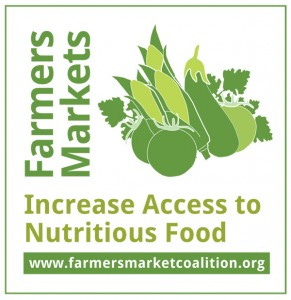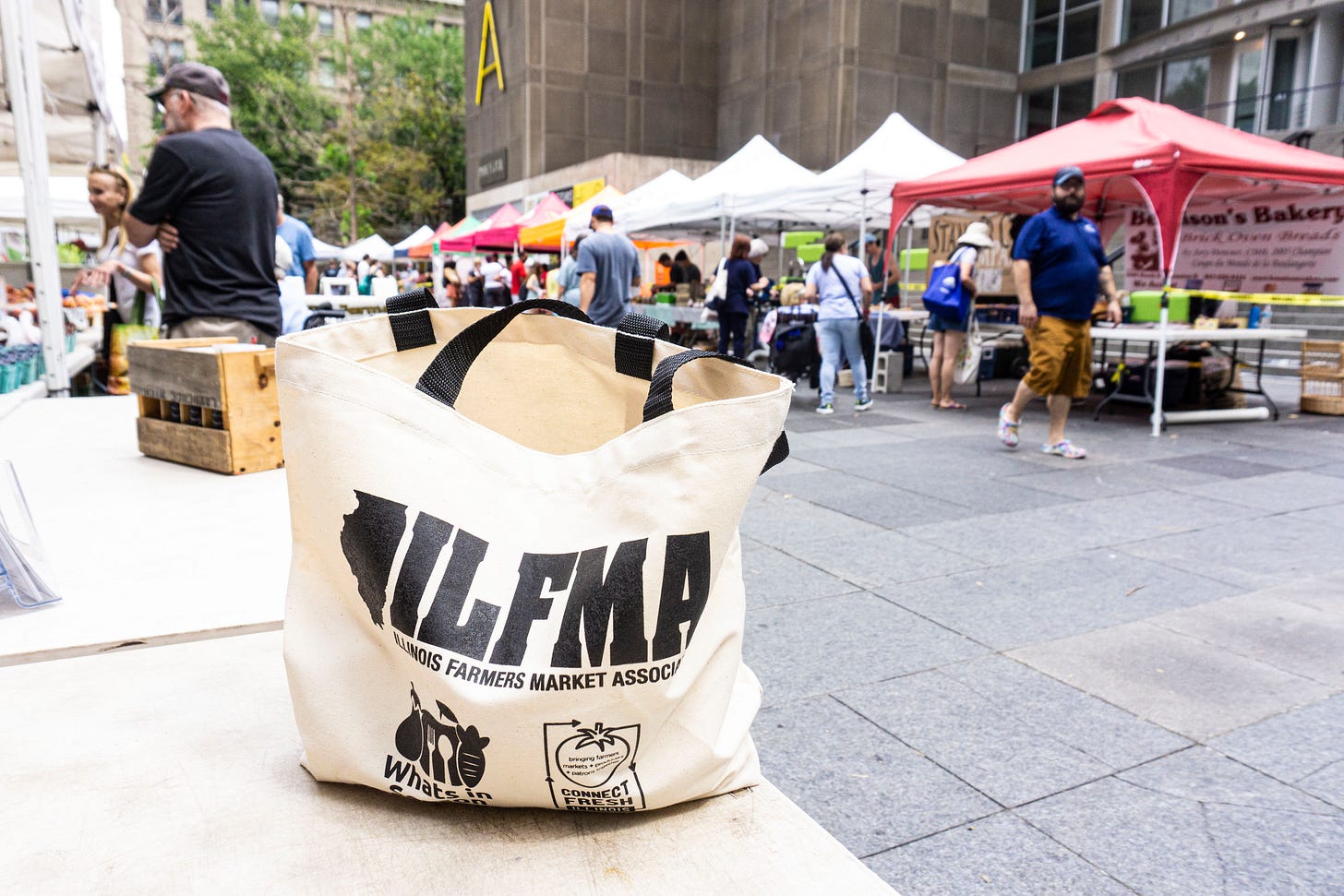National Sweep of Farmers Market Week
How the Farmers Market Coalition is coordinating the Aug. 1-7 event
In This Issue
• The National Sweep of Farmers Market Week
• Bob’s ILFMA Bag Was At SOAR Market Tuesday… Where Was It Today?
• The Name of That Vegetable: Turkish Eggplant
The National Sweep of Farmers Market Week
National Farmers Market Week — the singularly biggest event promoting farmers market shopping across the United States — gets under way this Sunday (Aug. 1) and runs through the following Saturday (Aug. 7).
In advance, we are publishing excerpted Q&As from my interviews with farmers market leaders, beginning with this article featuring Ben Feldman, executive director of Farmers Market Coalition, the sector’s national trade association.
Here is Ben’s bio on the Farmers Market Coalition site:
Ben has a long history in non-profit leadership, within the food system and at the Farmers Market Coalition. Prior to his current role as FMC’s Executive Director, Ben worked as the organization’s Policy Director and served as a board member. Ben’s career includes helping found the California Alliance of Farmers’ Markets, running the California Market Match Program, championing equitable food policy at the local, state and national level, and running the first farmers market on a Kaiser Permanente campus.
Ben lives in Albany, California, which he notes is located on territory of the Lisjan Ohlone tribe.
The graphics accompanying this article were creating by Farmers Market Coalition to highlight five key aspects of the importance of farmers markets.
————————-
Q: Please give our readers an overview of what Farmers Market Week is, and what the Farmers Market Coalition's role in encouraging participation.
A: I'll start with just a little bit of background on the Farmers Market Coalition. We are a national membership-based nonprofit, a 501(c)(3) with membership in all 50 states as well as Puerto Rico and Canada. Our mission is to strengthen farmers markets for the benefit of farmers, consumers and communities.
We do that primarily through a focus on farmers market operators, the organizations and individuals who plan, manage and execute farmers markets... There's a tremendous amount that these organizations and individuals do in order to facilitate the outcomes that so many people are looking for in farmers markets, but without a well-managed farmers market, it's pretty hard to achieve any of those goals...
Our specific activities fall into two main buckets, one of which is the work that we do to support farmers markets. That's a lot of resource creation, training activities, providing opportunities for them to learn from each other... It also includes work around data collection and other activities to support market operators. Then the other piece, and this starts to get towards National Farmers Market Week, is to serve as a voice for farmers market operators, and that includes our policy advocacy work, our work around consumer education, and promotion of farmers markets more broadly.
The single biggest activity that we engage in, in terms of promoting farmers markets to the general public, is through National Farmers Market Week, which has been going on for more than 20 years now. The USDA [U.S. Department of Agriculture] recognizes that each year with a proclamation honoring National Farmers Market Week...
In recent years FMC has really taken on the lead role in coordinating activities around National Farmers Market Week. One of the main things that we do, we developed a toolkit, which includes all kinds of ways that markets can engage shoppers, whether it's contests in their community or local proclamation templates, or sample op-ed templates, all kinds of things that really make it incredibly easy for farmers markets and market supporters to participate in National Farmers Market Week.
Q: Not everybody is a dyed-in-the-wool, multiple farmers markets a week fanatic like I am. What is the messaging intended for people who are not regular shoppers or are just marginal?
A: So for folks who may not be regular farmers market shoppers, a big part of what makes markets so special is the community experience of shopping at them. And then also that, as I'm sure you know, if you want the best produce in town, the farmers market is the place to get it...
Often the hook that gets someone to the market is they are looking for a product like the best summer peaches. That's sort of the first thing that brings them from market and then they may see another product they hadn’t seen before and they ask the farmer how to use it. Then you start to build this community, which what often is what keeps people coming back.
Q: We witnessed a resurgence of consumer interest in local food, farmers markets and CSAs during the pandemic, when the nation’s commercial food supply chain faltered to an unprecedented degree. How is that influencing your messaging for National Farmers Market Week?
A: Our top-level messages are that farmers markets are essential. When we were talking about this last year, it was trying to make the case that farmers markets were essential in order to make sure that they weren't in danger of being closed at a time when the ability of people to get food was sometimes in question. Those supply chain challenges that were being experienced in grocery stores, they're not present at farmers market because the supply chain is farmer direct to consumer, right? And so the supply chain is as short as it can possibly get. In times of difficulty and times of stress, the farmers market remains a place where people can get food.
Q: Most people had never experienced food insecurity. As soon as that stopped being the case last year we saw a burst through e-commerce when the farmers markets were mostly closed and then when the markets reopened. Supply reliability was an important factor, but also consumers’ heightened concerns about food and health, food and wellness, transparency, where their food comes from.
A: One of the unexpected outcomes of COVID is a lot more people were cooking and eating at home.
Q: I always say it's all about the ingredients. And this goes back to what you were saying about the best produce in town. This is a generational thing that if you have never shopped at a farmers market before, you're going to taste food the way your grandparents and your great-grandparents tasted it. But for decades, most people have been eating food that's been shipped from far away and sat in a warehouse and it has lost some of its freshness and also some of its nutrients. So I really think the best way to persuade people to go to farmers markets is to take them there and say, “Try this.”
A: That is definitely one of our points during National Farmers Market Week. If you're a dedicated shopper, grab a friend who maybe isn't a regular shopper and bring them out. The farmers market is its own best advertisement. There is its physical presence. You drive by it and you look at it and it looks like something you want to check out. There's a bunch of people there, there's bright colors. And when you get inside, it's an even better advertisement because then you experience the food and the community and all of the great aspects to it. So yeah, I think that's absolutely the case that the best way to get people to be market shoppers is to get them out to the market that first time...
And that kind of brings me back to something that you said about farmers markets being the starter kit for the good food movement. That's true in a lot of ways. If we look at the success of the alternative food system, the farmers market is one of the most successful examples. We have now thousands of farmers markets in our country and they're making real changes to our food system. I’ve seen estimates of over $2 billlion in sales through farmers markets and that's real commerce. That is something that causes people who are really only concerned about the economics to stand up and take notice.
But beyond, we are influencing the rest of the food system about the quality and how our food tastes relative to previous generations. Grocery stores have really taken a lot of their cues in the last 10-15 years from farmers markets. The produce sections of grocery stores are so much better than they than they used to be. And restaurants are featuring farmers and farm names on their menus. And many of the approaches to combat food insecurity, such as the [food assistance benefit] doubling and produce prescription programs, were tested initially in farmers markets. These are examples of the ways in which farmers markets are really on the forefront of changing our food system for the better.
Bob’s ILFMA Bag Was At SOAR Market Tuesday
The answer to our traveling tote quiz Tuesday: Bob’s Illinois Farmers Market Association bag was at SOAR Market in downtown Chicago. The market, located a couple of blocks east of Michigan Avenue, is in the Streeterville neighborhood, and SOAR stands for Streeterville Organization of Active Residents.
The major cultural venue adjacent to the market is the Museum of Contemporary Art. The famed Chicago landmark nearby is the Water Tower, one of the few buildings in this part of the city that survived the Great Fire of 1871.
So Where Was Bob’s ILFMA Bag Today?
So many markets to visit, so little time. Today Bob and his loyal tote visited a market that was started in 1999, soon moved to a park named for a very famous Illinoisan, and helped establish the concept of producer-only markets in Chicago with vendors only from the Lake Michigan region. The residents to the east of this market are just animals. Where were we?
The Name of That Vegetable: Turkish Eggplant
That lovely green-tinged orange produce in yesterday’s Name That Vegetable quiz is the Turkish eggplant, on sale at the Nichols Farm and Orchard stand. Since I have no prior knowledge of this plant, here’s the description from the Specialty Produce website.
What They Are: “Turkish eggplants, botanically classified as Solanum aethiopicum, are members of the Solanaceae or nightshade family, which includes potatoes and tomatoes. Also known as Scarlet eggplant, Ethiopian eggplant, Gilo, Garden Eggs and Mock tomato, Turkish eggplants are favored and often used as a culinary ingredient when they are green and young. It is also commonly used as an ornamental fruit and offers vibrant red and orange hues for an aesthetically eye-catching decoration.”
Where Did They Originate: “Turkish eggplants are native to Africa and are believed to be more closely related to wild eggplant species than the traditional purple eggplant grown in Asia.”
What Do You Do With Them: “Turkish eggplants are best suited for cooked applications such as grilling, sautéing, baking, frying, pureeing, stewing and pickling. When young, they are popularly used in stews and curries. As they mature and take on a more bitter flavor, they are typically hollowed, stuffed with grains and other vegetables, and baked. They can also be pickled. Turkish eggplants pair well with garlic, peaches, fennel, herbs such as oregano, cilantro, mint and parsley, cinnamon, lemon juice, Greek yogurt, pine nuts and basmati rice. Turkish eggplants will keep up to three days when stored in a cool and dry place.”
I bought a starter kit of a few Turkish eggplants and will let you know how that turns out.











